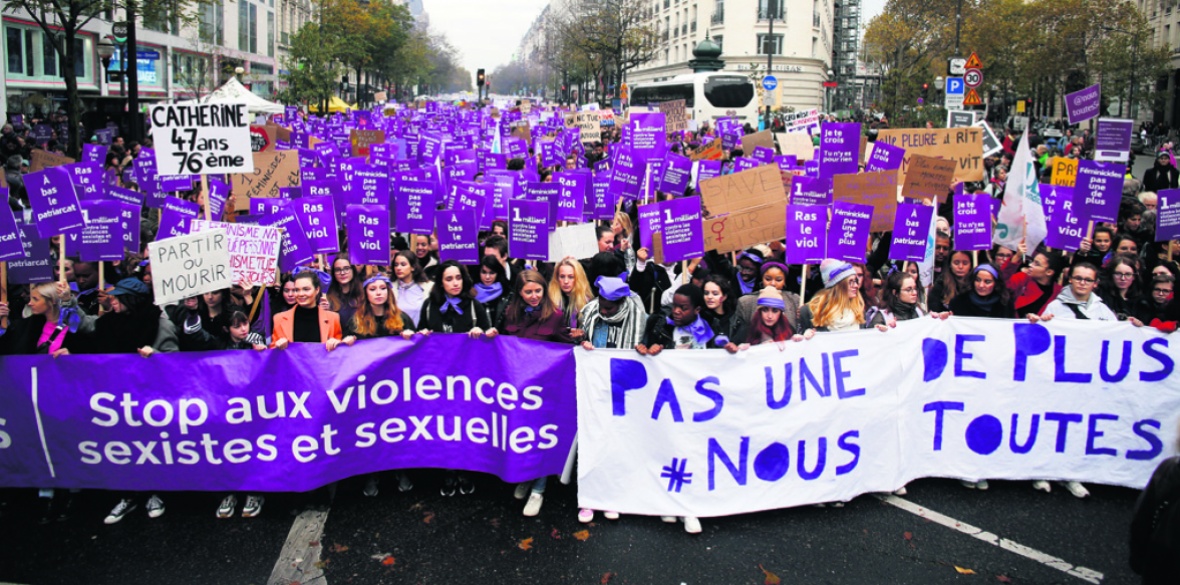This is the last article you can read this month
You can read more article this month
You can read more articles this month
Sorry your limit is up for this month
Reset on:
Please help support the Morning Star by subscribing here
TODAY is the United Nations general assembly’s International Day for the Elimination of Violence Against Women — this year’s theme “Orange the World: Generation Equality Stands Against Rape.”
It is a social and political calamity that gender-based violence throughout the world is still so endemic and tenacious.
According to 2019 Home Office statistics, in Britain “one in four women will experience domestic abuse and one in five sexual assault during her lifetime” (this rises to one in three across the world).
Prosecutions and convictions for reported domestic violence and rape are falling according to the Crown Prosecution Service’s annual Violence Against Women Report (VAWG) published on September 12 this year. We need to find answers as to why there is a growing gap between recorded crimes and cases going to court.
However, most violence is not reported for a variety of reasons and some of those who suffer it are especially vulnerable – eg young girls, migrants and refugees, ethnic minorities or those who live with disabilities.
The date chosen by the United Nations is highly significant historically. In 1960, on this date, three sisters of the Mirabal family, Patria, Maria Argentina Minerva and Antonia Maria Teresa, were assassinated by the secret police force of Raphael Trujillo, the brutal dictator of the Dominican Republic.
Revolutionary heroines, the sisters worked relentlessly against the regime for the restoration of democracy in their country. Working clandestinely, they called themselves Las Mariposas (the butterflies) and set up the Movement of the Fourteenth of June, commemorating the date of a massacre carried out by the regime that Patria had witnessed.
Producing and distributing pamphlets, the sisters also planned for a full-scale revolt against Trujillo, which they knew would have to involve a popular armed struggle.
Their deaths have contributed to an awareness that violence against women has a strong connection with imperialism, militarism and war. Rape and violence are used as weapons against women and girls living through imperialist wars or imperialist-sponsored conflicts and the humanitarian crises that result.
In neo-colonialist countries like Britain and the US, violence which glorifies war as a solution for settling disputes is positively portrayed in the culture of our everyday lives. These corrupting ideological influences legitimise aggression and encourage unquestioning acceptance of using military force to enforce political objectives – and can be shown to have links to rising levels of incidents of domestic violence, the majority of which are against women.
Cynthia Cockburn, the feminist activist in the international women’s peace movement who died on September 12 this year, carried out important research on gender violence and its relationship to peace and war. Her work includes a strong critique of Nato’s manipulation of UN Security Council Resolution 1325 on Women, Peace and Security, passed on October 31 2000 which, together with other resolutions since, forms their Women, Peace & Security Agenda.
On November 25, women around the world will begin 16 days of activism, an initiative begun by the Women’s Global Leadership Institute in 1991, linking the date to UN Human Rights Day on December 10.
Actions will raise awareness that every day, women and girls suffer from all kinds of violence including sexual, physical and psychological exploitation in human trafficking, modern slavery, female genital mutilation and child marriage, as well as long-term consequences such as emotional and reproductive health problems which can permanently blight women’s lives.
The legacy of Las Mariposas is the example they have given to women everywhere struggling against oppression and actively campaigning for social justice including an end to gender-based violence.
Carol Stavris is women’s organiser for the Communist Party of Britain.










